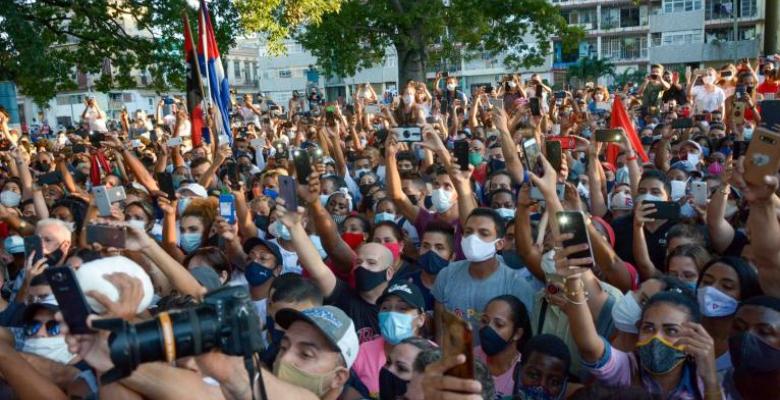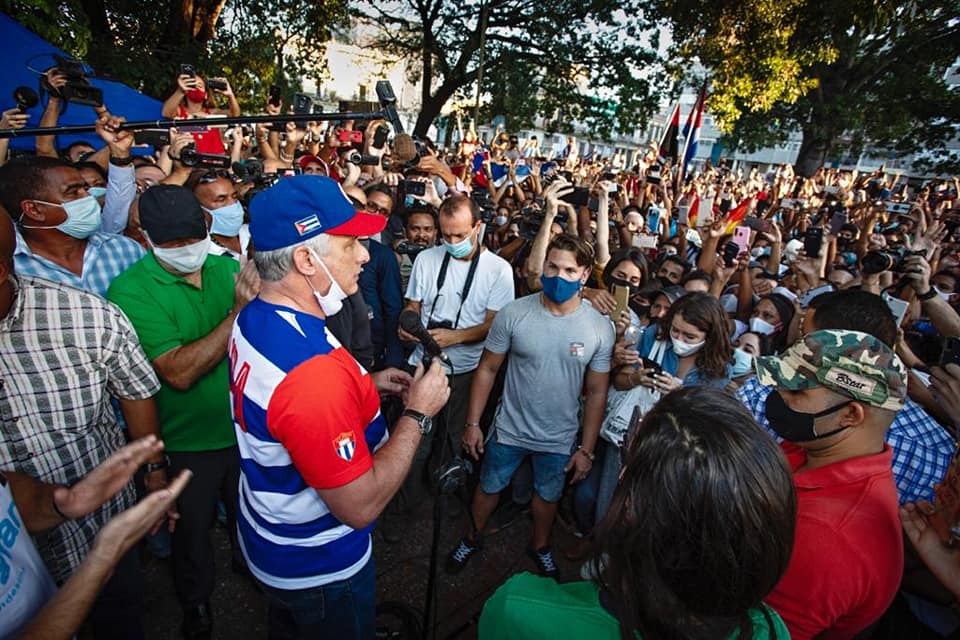A NOT-SO-BRIEF CHRONICLE: A path that has long been our roadmap
especiales

The government did not summon any of them. Mass or political organizations did not summon any of them. They were not forced to be there by any administration or executive board. They were there because they wanted to, because they saw the summoning in social networks and believed they needed to be there. They believe in the Revolution and the legitimate ways to update itself.
“These are critical times —Lisandra says, wearing her blue face masks and hair queue—; we must be aware of the sort of things at stake. I am here because this is the Revolution, —with its flaws— that my parents taught me to love. And they also taught me to be critical about it, while remaining loyal to it. I do not think the Revolution is an abstract thing. The Revolution is made of you, and me because me and you give life to it every single day.”
We need to do our best to listen to her. There are lots of applauses, music. People shout slogans and sing songs. There are many, perhaps hundreds of people at Trillo Park at base of the monument of the irredeemable Quintin Banderas in the very popular, profound Havana. “I love this is a very spontaneous event —adds a friend of Lisandra. You come here because you feel you are part of something. Some will come out of curiosity, to see what is going on. But most are here to support the Revolution. And that is easy to prove.”
Yes, it can be proven. The speakers get the audience’s approval. There are no, as we may say, well-versed or well-thought speeches. There are powerful statements. There are insights about a very complex reality. There are proposals for a brighter future. They are young, but they want to erase the perception that Cuban youth does not care about politics, that they cannot or do not want to mobilize by themselves and so they need to be pushed.
But young people are not the only ones attending. Rosa (gray hair, blue eyes, face mask with flowers) likes the idea of being surrounded by so much energy. Although distant from the masses (“I am a woman at risk, I need social distancing”) say she was involved in the literacy campaign in the early years of the Revolution. And then she was harvesting coffee beans at Sierra Maestra mountains. And then she was member of the Cuban militia and saw Fidel many times at the Revolution Square. “I am pretty sure Fidel would have been here supporting these young boys and girls. And perhaps, president Diaz-Canel may come here as he is the apprentice of Fidel. I wish he could come.”
After a few moments, as if he were listening, president Díaz-Canel showed up. Some did not believe it. Even the organizers got surprised. He was there in casual wear. He was there against the will of his own son, because he got excited with what was going on, with what people were saying and he felt he need to show his support, without protocols, as he —he said— still feels young.

He did not want to distort the event with his presence (many in the audience backed his attendance). “I was brimming with emotion and I had to be here. Some suggested I should have not come here so the enemy could not misinterpret the naturalness of this demonstration.”
He left quickly. But before, he spoke with the full determination that the Cuban people will not turn their back to the dream of many: “the instigators believed they could destroy the Revolution before the end of the Trump administration, but their hope will not come true. There will be always room to dialogue, to improve and perfect socialism, always.”
He ended his brief speech by calling the attendees to sing along with him Silvio Rodríguez’s song he likes the most: Pequeña serenata diurna:
I live in a free country
Which can only be free
On this land, in this instant
And I am happy because I am giant.
I love a clear woman
Who I love and who loves me
Asking nothing – or almost nothing,
Which is different but also the same.
And as if that weren’t enough
I have my songs which little by little
I grind up and remake inhabiting time
As it befits an awake man.
I am happy, I am a happy man
And I hope that I may be forgiven
On this day
By those who have died for my happiness.
“Do you think it is casual he asked to sing that song?” —A friend of mine said. “Listen to the lyrics, listen to how this song ends. He is a clever man.”
Díaz-Canel left and people stayed longer, listening to songs, greetings friends, waving flags. Mass or political organizations did not summon any of them. They were not forced to be there by any administration or executive board. They were there because they wanted to. “And some want to ignore this truth —my friend says—: The Revolution has a lot of people ready to defend it. Defending the Revolution is like defending yourself. That is a fact.”
On Sunday, the Trillo Park continued the roadmap.
Translated by Sergio A. Paneque Díaz / CubaSí Translation Staff













Add new comment